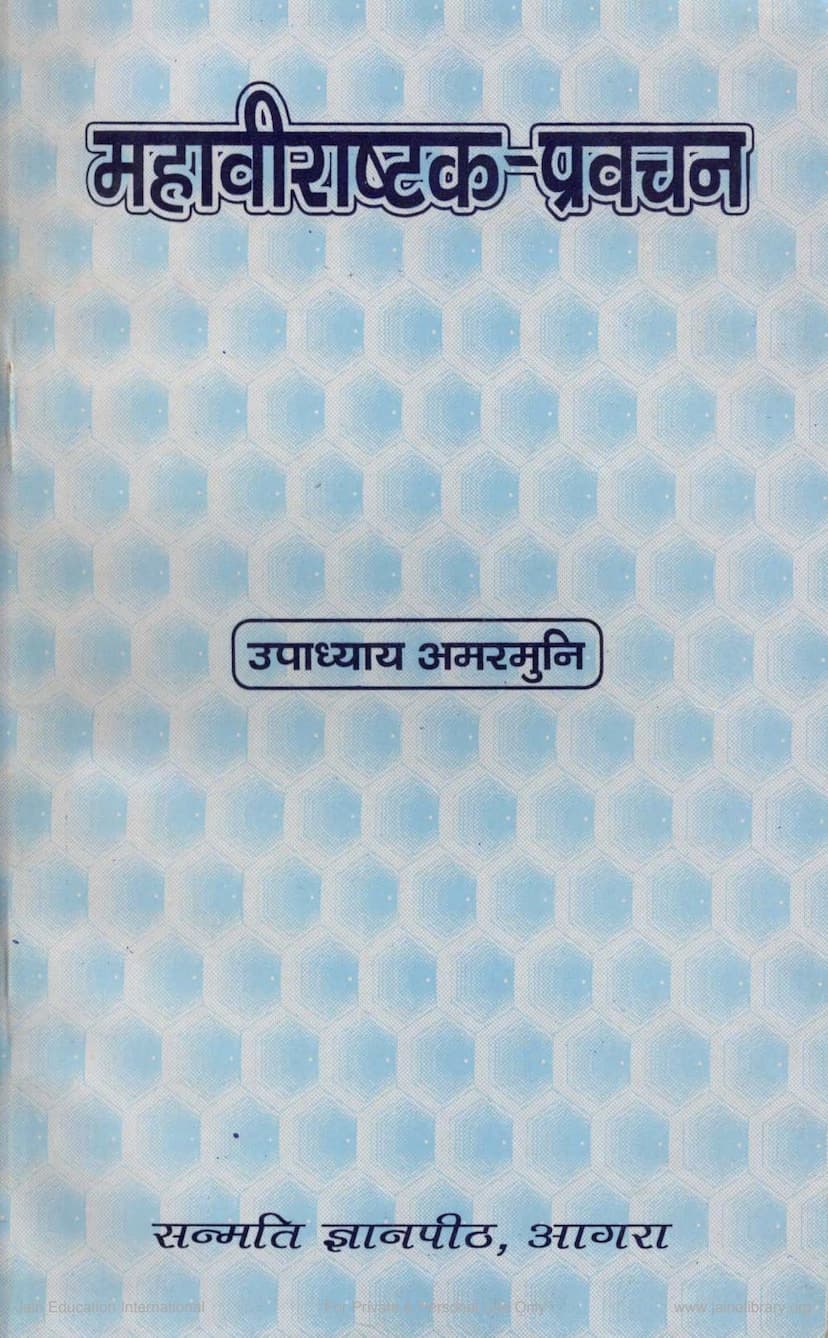Mahavirashtak Pravachan
Added to library: September 2, 2025

Summary
Here's a comprehensive summary of the Jain text "Mahavirashtak Pravachan" by Bhagchandra Jain Bhaskar, based on the provided pages:
Book Title: Mahavirashtak Pravachan (महावीराष्टक-प्रवचन) Author of the Stotra: Bhagchandra Jain Bhaskar (भक्त कवि भागचन्द्र जी) Commentator/Speaker: Upadhyay Amar Muni (उपाध्याय अमर मुनि) Publisher: Sanmati Gyan Pith, Agra (सन्मति ज्ञानपीठ, आगरा) Catalog Link: https://jainqq.org/explore/001376/1
Overview:
"Mahavirashtak Pravachan" is a compilation of discourses by the revered Jain scholar and spiritual leader, Upadhyay Amar Muni, on the "Mahavirashtak Stotra," a devotional hymn composed by Bhagchandra Jain Bhaskar. The book, published by Sanmati Gyan Pith, Agra, presents a detailed exposition of each of the eight verses of the stotra, exploring the profound spiritual and philosophical insights of Lord Mahavir.
Key Themes and Content:
-
The Mahavirashtak Stotra:
- The stotra itself is a devotional composition by Bhagchandra Jain Bhaskar, a scholar of the Digambar tradition.
- It praises Lord Mahavir, focusing on his divine qualities and teachings.
- A notable aspect mentioned is the differing views on Lord Mahavir's marital life and offspring between the Shvetambar and Digambar traditions. However, the stotra, apart from this specific point, is filled with devotional sentiment.
- The stotra is composed in the elaborate Shikharini meter, praised for its flowing and expressive style, free from complex compound words, thus possessing "Prasad Guna" (clarity and lucidity).
-
The Role of Stotras in Jain Literature:
- The book highlights the significant place of "Ashtakas" (eight-verse compositions) in Jain devotional literature.
- It references other prominent Jain acharyas like Acharya Haribhadra Suri (who composed 32 Ashtakas) and Acharya Mantunga (author of the popular Bhaktamar Stotra on Lord Rishabhdev) and Acharya Siddhasen Divakar (author of the Kalyan Mandir Stotra on Lord Parshvanath).
- It also mentions the earliest stuti (praise) by Sudharma Swami, the fifth Gandhar, in the form of "Vira Stuti" in Prakrit.
-
Upadhyay Amar Muni's Commentary (Pravachan):
- The core of the book is Upadhyay Amar Muni's discourses, which offer a deep and insightful explanation of each verse of the Mahavirashtak.
- Verse 1: Focuses on Lord Mahavir as an omniscient being whose knowledge encompasses all beings and objects, both animate and inanimate. He is described as the "witness" to the world, revealing the path to liberation through detachment.
- Verse 2: Highlights Lord Mahavir's freedom from passions (kashayas) and his state as a pure Arhat. His unwavering and calm eyes are interpreted as indicative of his equanimity and freedom from anger. The commentary uses the analogy of painting moonlight without color to explain the purity of the soul.
- Verse 3: Emphasizes Lord Mahavir's supremacy, bowing to whom even celestial beings find their jewels in their crowns illuminating his feet. His remembrance quenches the fires of worldly existence. The commentary contrasts human and divine greatness, stressing Mahavir's humanism and the power of inner spiritual wealth over external status.
- Verse 4: Illustrates the transformative power of devotion through the example of Nandana Mendhak (frog). Even a humble devotion can lead to divine states, highlighting that true devotion leads to liberation.
- Verse 5: Describes Lord Mahavir as possessing a golden complexion yet being detached from the body, being a repository of knowledge, unique, the son of King Siddhartha, unborn, glorious, free from worldly attachments, and possessing wonderful gati (conduct/path).
- Verse 6: Praises Lord Mahavir's speech as a pure Ganga of knowledge, quenching the thirst of the suffering masses. His teachings are depicted as being embraced by learned scholars, emphasizing the timeless and purifying nature of his message.
- Verse 7: Focuses on Lord Mahavir's conquest of Kama (desire/lust) even in his youth through spiritual strength, leading him to the state of eternal bliss. The commentary discusses the internal battle against passions and Mahavir's victory through self-discipline.
- Verse 8: Portrays Lord Mahavir as an opportune physician curing the disease of Moha (delusion), an impartial friend, renowned for his auspiciousness, a refuge for the suffering, and possessing supreme virtues. The commentary likens him to a physician who opens the eyes of the blind, curing the delusion of the world.
-
The Essence of Prayer and Devotion:
- The commentary repeatedly emphasizes the idea of "Nayan Patha Gami Bhavatu Me" (May you be on the path of my eyes), signifying a deep desire for the divine presence to be constantly within one's vision and consciousness.
- Prayer is defined not as asking for material things but as achieving one's true essence and meaning in life.
- True devotion is about the integration of the divine within oneself, leading to liberation from worldly suffering.
-
Additional Texts:
- The book also includes two other "Ashtakas":
- Amarashtakam (अमराष्टकम्): Composed by Professor Rammohan Das, it extols the virtues and spiritual qualities of Upadhyay Amar Muni himself.
- Chandanastakam (चन्दनाष्टकम्): Also composed by Professor Rammohan Das, it is dedicated to Acharya Chandana Ji, a disciple of Upadhyay Amar Muni, praising her spiritual stature and service to humanity.
- The book also includes two other "Ashtakas":
Significance and Contribution:
"Mahavirashtak Pravachan" serves as a valuable resource for Jain scholars and devotees. It not only elucidates a significant devotional work but also provides a platform to understand the multifaceted teachings of Lord Mahavir through the insightful commentary of a contemporary spiritual master. The inclusion of Ashtakas dedicated to the gurus themselves further underscores the lineage of spiritual knowledge and devotion within Jainism. The book emphasizes the importance of integrating spiritual wisdom into daily life and the pursuit of liberation through sincere devotion and ethical conduct.